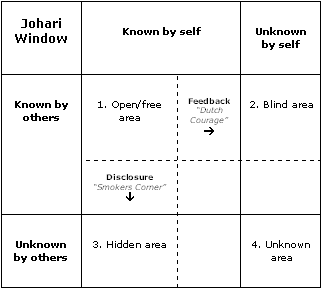Increase Self Awareness and Be More Effective In Groups with the Johari Window Model
Cigarettes and alcohol can increase your personal effectiveness. “How can that be, they’re bad for you!” I hear you cry. Well, there’s a strong case for cigarettes and alcohol at work, and probably not the one you’d expect. Find out how these unlikely allies can increase you personal effectiveness (with a little help from the Johari Window model).
But first things first. The “Johari Window”, is a useful management model created by Joe Luft and Harry Ingham.
How the Johari Window Improves Teamworking
The Johari Window model gives a framework for understanding and improving self-awareness. Greater self-awareness can make you more effective in group situations, improve your interpersonal skills and build better relationships.
All the best management models have four quadrants and the Johari Window is no exception ;>)
The Johari Window Model

Here’s what the different segments mean…
1. Open/free area – Known by Self, Known by Others
This area includes all information freely shared by you to others around you. Some information is unavoidably in the open area, such as your body shape, or eye colour. Other information such as your views, experience, and knowledge are divulged by simply spending time with you.
The simple aim is to increase you open area, by decreasing the other three areas.
2. Blind area – Unknown by Self, Known by Others
This area is the “spinach on your teeth” information – you’re blissfully unaware your pearly whites more closely resemble a cows. If only someone would tell you! You can decrease your blind area by actively seeking feedback from people. Scary stuff, but consider the alternative of not knowing.
3. Hidden area – Known by Self, Unknown by Others
It’s probably best to leave your skeletons in your closet and your demons in your mind, and open up in other ways. There is some personal information that is useful to share, helping people better understand where you’re coming from. Mind reading is a rare skill, so save time by disclosing more about yourself.
4. Unknown Area – Unknown by Self, Unknown by Others
People who lack experience or low in self belief may have a large unknown area. Good managers explore this area of potential and bring out dormant skills, abilities and talents by providing learning opportunities and a mistake proof culture.
Johari, Cigarettes and Alcohol
So what’s the Johari Window got to do with cigarettes and alcohol? Keep in mind that the simple aim is to increase your own and team’s open area, by becoming aware of blind spots and disclosing hidden areas. Feedback flows more freely when the “Dutch Courage” from alcohol sets tongues wagging and loosens inhibitions. And cigarette smokers spend 10 minutes in “Smokers Corner” every few hours to do little else but chat and learn more about each other.
Okay, so I’m not seriously suggesting you take your workmates on a drinking extravaganza and encourage a free for all slanging session fuelled by Dutch courage. What I’m suggesting is actively working on giving and receiving feedback within your team, and creating environments that make it easier to do so. We have a duty to provide only helpful, constructive and above all, sensitive feedback and alcohol impairs our soft skills.
Learn from smokers and create frequent, informal times to chat within your team – maybe even set up a smoke free “Smokers Corner”. Yes chatting is necessary at work! People are more likely to open up when they know your favourite dance record, how you came to speak Serbo-Croat fluently and about your horse jumping medals.
So I put it to you, the case for cigarettes and alcohol in the workplace, coupled of course to the Johari Window, and their role in increasing interpersonal effectiveness. Use the “Dutch courage” principal to help you give and receive feedback and reduce blind spots. Use the “Smokers Corner” principal to help you find out more about others and share more about yourself.
Take the first step in increasing your effectiveness and start using the Johari Window model with your colleagues.